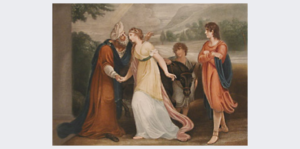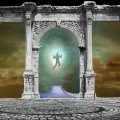Caleb and his daughter
or
“Prayer” (if you prefer)
Philippe Paquette

“Then it happened that when she came to him, she incited him to ask her father for a field. Then later, she dismounted from her donkey, and Caleb said to her, “What do you want?” 15 She said to him, “Give me a blessing: since you have given me the land of the Negev, give me springs of water also.” So Caleb gave her the upper springs and the lower springs.”
Juges 1: 14-15
There are two different interpretations about this story.
A) The negative one presents Aksah, (other spellings are: Akhsah, Achsahr, Aksar, Ax.) as an unsatisfied or greedy daughter, a demanding and ungrateful woman towards her father Caleb;
B) and the second interpretation presents a positive side of Aksah and this is my position. Aksah may be little known in the Bible. Yet, she is mentioned 5 times in the Scriptures and this very verse is repeated twice in two different places (Judges 1:15 & Joshua 15:19). Thus, the importance of this Scripture. After all, if God puts such importance on this women, there is a good reason.
The context.
Aksah was Caleb’s only daughter. She had 3 brothers. Caleb (grandson of Judah), was also the closest friend of Joshua We can, therefore, consider Caleb as the General in Chief of Israel’s huge army. Thus, consider him as a most powerful and courageous soldier.
Caleb also had a strong faith in the Lord and he was known for his courage. Among the 12 spies sent to assess the promised land and its inhabitants (and to see the cemetery of the elders of Israel), 10 returned to give Moses bad news by saying that the people dwelling in the promised land were too powerful for Israel’s army. Certain dwellers there were also of the same race as Goliath, therefore the race of giants. (Descendants of the fallen angels who visited human women in Genesis – a race that is extinct today).
The courage.
Unlike the other 10 spies, Joshua and Caleb declared to Moses that the country was propitious to take. According to Numbers 13; 14, Joshua and Caleb are the only two of the twelve spies who will enter into the promised land.
During this time, Caleb invites volunteers of his army to lead and destroy a certain enemy. As a reward, the victor would have his daughter, Aksah, in marriage.
Joshua 15:16: Caleb said,
“I will give my daughter Achsah as a wife to the one who beats Kirjath-Sepher …” (this is the city of Debir of the Canaanites).
Caleb’s half-brother, Kenaz, had a son named Othniel. Othniel was deeply in love with Aksah. Othniel took all his courage and directed the destruction of the enemy and was united with Aksah in marriage. (By the way, the ancient Jewish tradition claims that Aksah was unbelievably beautiful, so much so that most Jewish women were jealous of her).
Eventually, all the enemies of Israel will be destroyed or conquered and the country will, at last, be united in their original homeland as “Israel”. They are back home!
The wedding gifts.
Aksah asks Othniel to request from Caleb a wedding dowry and receives a large piece of land. Above and beyond a field already received, Aksah asks her husband Othniel, (who will become the very first Judge of Israel and recognized in the Bible as a faithful servant to God) for more than the land. But Othniel does not dare approach his Father in Law, Caleb. We don’t know exactly why Othniel is reluctant. Was it because Othniel was too timid? Or would it be because he feared Caleb? Scripture is silent on this issue. But know this. Caleb’s name may give us a hint. Caleb, by definition, meant in Hebrew, “the dog”. Can we therefore suppose that Caleb, being in such a position of authority in the Army, may have had a rather frightening personality? At any rate, Othniel refuses to ask more from Caleb.
So, on her own, Aksah breaks tradition and comes to visit her father, boldly but respectfully. It appears that Aksah loved her father and had confidence that her father loved her profoundly. After all, when Caleb’s wife gave birth to their only girl, Caleb was so joyful that he called his new born girl “Aksah”. This name, in Hebrew, means “jewel” or more specifically “anklet bracelet”. This denotes the love that Caleb had in the birth of a girl. So, Aksah dares to approach her father, thankful for receiving a piece of land. She came on a donkey… but she comes down from the donkey to approach her father. In the Old Testament, this is a sign of respect. (See also Rebecca coming down from her camel to approach her beloved Isaac).
Aksah was a virtuous woman and shared the same faith of her Father.
When conquering the Promised Land, Caleb asked Joshua for a land when Joshua divided the land between the tribes: Joshua 21: 9-12
“… and they gave the cities that were to be named by their name, and were for those who came down from Aaron among the clans of the Kohathites and the descendants of Levi. Indeed, fate had indicated them first. They gave them Kirjath-Arba, that is, Hebron in the mountainous region of Judah, with its surroundings, the territory that surrounds it. Arba was the ancestor of Anak. But the countryside and villages which depended on the city had been granted as possession to Caleb, the son of Jephunneh.“
The conclusion.
Caleb gave his daughter much more than Aksah could expect. Jewish culture at that time gave a piece of land to a man but to a woman, gifts were exclusively either jewellery and / or money, never land or anything related to land.
Judges 1: 15 “She said to him, “Give me a special gift. You have given me the land of the Negev. Give me the wells of water also.” So Caleb gave her the wells in the high land and in the valley.” According to the custom of the time, Caleb could have simply given her jewels or money. But he responds positively to her request by giving her far more than what she asked for.
Caleb gives her a multitude of water sources. All the sources from the north and all the sources from the south, “
the upper and the lower springs“.
Symbolism
The symbolism of the story of Caleb and Aksah represents the goodness of God in our requests, our prayers, our petitions and our divine blessings. We receive from God
heavenly blessings (upper springs) and
earthly ones, the material for our human needs (lower springs).
Christians generally forget their “
acquired rights“. That of “
asking“. And God answers our requests faithfully and
exceedingly.
We must believe in the words of the Lord, Jesus of Nazareth. “
Ask and you shall receive“. This is a divine promise and it then becomes our “right” because of HIS love.
So, let us ask! It is up to us to “dare and insist”. That is what HE expects of us.
#philippepaquette












Beautiful!
I prayed and asked earlier tonight.
Like you wrote, I never do, I should ask more often.
Thank You!
What is also most special about prayer is that it brings you in a special moment of intimate relationship with God or Christ and your soul is refreshed deep inside your heart and gives you a blessing. You always feel better after prayer, knowing that you were in a moment of intimacy with the one that loves you the most in existence, your spiritual Daddy (Romans “Abba Father” means Daddy) or your Lord and Savior.
Also, remember that you can pray anytime. I do every time I walk outside and look up in heaven.
This is great research. I have enjoyed the article so much.
That story in the Bible touches me a lot.
Thanks for the study of it!
A Beautiful posting with lots of good information. oftentimes we don’t always see the importance of what we think are small details in the bible. This story of Caleb daughter this the perfect example. oftentimes we over look the biggest secret the bible has to share because we don’t take time to spend more time asking and looking for why God thought to include that tidbit in the bible.
So so true Marie-Laurette. You wrote:: “…oftentimes we overlook the biggest secret the Bible has to share because we don’t take time to spend more time asking and looking for why God thought to include that tidbit…”.
So true. In fact, I discovered the pearl in the article simply because a wonderful sister in Switzerland asked the question that since Caleb’s inheritance (land) was known to be dry and harsh, why Caleb would give his daughter a bad field? Traditionally, Christian teachers teach that Caleb’s daughter deserved a bad response to her audacity of asking (envy)… but Caleb actually gave his gorgeous daughter (“she had looks to die for” according to Jewish advanced studies) two sources of water, consequently, 2 streams. Not one but two! In essence, Caleb gave her something beyond any price (life) and far beyond what she asked for.
That is the discovered gem of this story that I learned in searching for the answer. Caleb is a figure of God our Father.
Thanks for noticing. Wonderful point you make!
Philippe
I’m reading through the Bible now, starting at Genesis I made my way through to Judges and noticed Aksah mentioned again in the exact same context as you said, was written in Joshua, and I became so curious as to why God seemed to highlight this person and what she did. Thank you so much for this article!! I really loved learning more about her!! This story has taken a special place in my heart (and I only just started reading the scripture!) Thank you so much!!
Hey Jada,
So nice to read you and very happy that you also discovered the gems of Scripture in relation to Aksah. You know, if God mentions one individual and especially a woman 3 times in the Holy Scripts, there is a reason and it is a delight to discover those precious stones. I also read daily the Bible and I am always amazed at the new items I discover. Yet, I have read the Bible and studied it for the past 48 years… and it’s always refreshing and nuggets of celestial gold is being found each time.
Enjoy your readings and be blessed.
Phil
This is quite expository and best explanations of the Aksah story. I am blessed, needless to say.
Dear David,
Thank you for your very kind words. Your sweet kind soul gives me encouragement in my humble service to our Lord.
Let us always remember to dare ask our loving Father in our prayers. HE will respond with far more than what we asked for. That is HIS way.
Be blessed,
Philippe